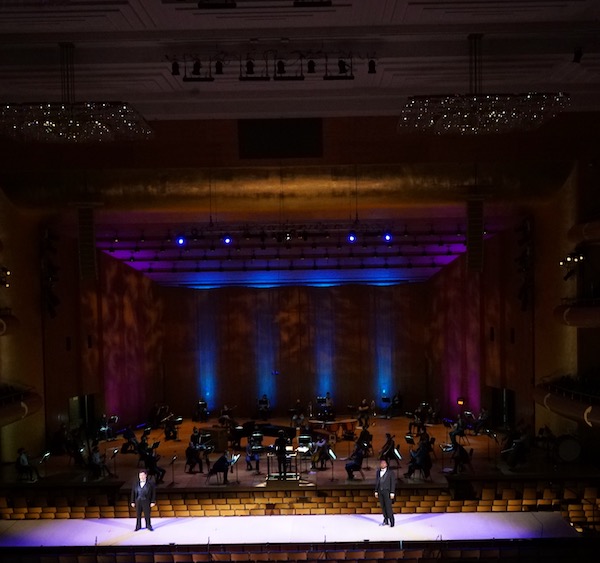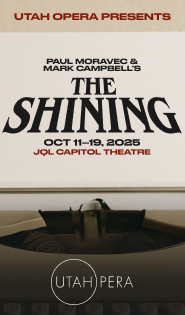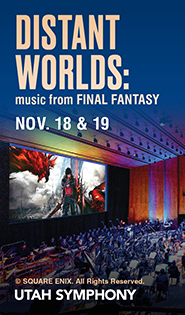Utah Opera signals an evening of hope with “Light on the Horizon” concert

Utah Opera opened its season last October with an in-person but socially distanced double bill of Poulenc’s The Human Voice and Joseph Horovitz’s Gentlemen’s Island.
Four months later the pandemic is still with us though there is hope, as reflected in the title of the company’s second production, Light on the Horizon. Premiering Friday night–and available through March 14–this streaming concert featured six singers, 35 musicians, and a program ranging from Handel to Sondheim.
Like its first production, “Light on the Horizon” showed the depth of the company’s commitment to both safety and artistic excellence. The singers stayed six feet away from each other and the same distance was maintained between the mostly masked musicians on the stage. That created a clarity of sound rarely heard from the orchestra pit, allowing the audience to hear the individual orchestral lines and counterpoint.
This gave the swashbuckling Overture to Mozart’s La clemenza di Tito, which opened the concert, a more refined wit and depth, under the baton of Robert Tweten, in his 14th guest appearance with Utah Opera.
True to its purpose, the overture prepared the audience for an evening of opera, which came after taped statements from Tweten and Utah Opera artistic director Christopher McBeth. Between the musical numbers, we would eventually hear similar statements from each of the six singers. Filmed in the lobby of Capitol Theatre, the segments were brief, casual, and offered personal acknowledgements of the pandemic’s hardships and hope for a brighter future. The spoken comments provided an intimacy that made the viewer root for the performers and the production to succeed.
On the whole, the production did so resoundingly, with a level of quality as high as anything Utah Opera has ever produced. Without a printed program, perhaps brief explanations of each scene’s dramatic context or a few words on the screen would have been helpful to figure out the context of each piece.
This was particularly true of the first number “Son nata a lagrimar” from Handel’s Julius Ceasar, which, though gorgeously sung by contralto Dana Beth Miller (making her Utah Opera debut) and mezzo soprano Edith Grossman, proved a bit static. However, most of the program, directed by Julie Wright-Costa, conveyed the passion and emotion of each scene as much as is possible in evening clothes with an orchestra on stage.
One high point was soprano Abigail Rethwisch’s stunning rendition of “Sempre libera” from Verdi’s La Traviata. Last seen in Utah Opera’s January 2020 production of Kevin Puts’ Silent Night, Rethwisch turned in a bubbly, buoyant rendition of Verdi’s lyric warhorse, her silky voice effortlessly bouncing over every run as her character struggled with whether to follow a doomed love affair or remain in the champaign-soaked world of a courtesan. Tweten seemed to take the piece a little slower than usaual, which accommodated Rethwisch well.
Another glorious moment was Miller’s performance of “Mon coeur s’ouvre à ta voix” from Saint-Saëns’ Samson and Delilah. Over a warm, sensitive orchestral backdrop, Miller opened her heart, using her whole body to build to the piece’s musical and emotional climax. Miller also acquitted herself well in “Climb Ev’ry Mountin” from Rodgers and Hammerstein’s Sound of Music. With a rich, communicative tone, she passed easily from the low notes of the opening stanza into her lovely high register, bringing the piece home with her focused passion. Her performance made full use of the stage and was ably captured by Lone Peak Productions’ cinematography.
Gilbert and Sullivan was well represented with “Stay, Frederic, Stay” from The Pirates of Penzance, and “Then one of us will be a Queen” from The Gondoliers. The former is a sublime moment in a broad farce, and the duo of Utah Opera resident artists Daniel O’Hearn (tenor) and Julia Gershkoff (soprano) largely ignored the farce and focused on the sublime. Both of their voices rose expressively above the orchestra (with Tweten again seeming to take a slower tempo than usual).
“Then one of us will be a queen”, by contrast, played up the source material’s comedy, with the four performers ably executing a grapevine step during the repeated chorus. Gershkoff and O’Hearn were joined by fellow resident artists Brandon Bell and Grossman, whose patrician accent and regal head-tosses were delightful flourishes.
The four resident artists also came together for a touching rendition of “No One is Alone” from Sondheim’s Into the Woods. Originally written as a duet for Broadway tenor and soprano, this version expanded to an operatic quartet, beginning with Grossman’s gorgeous, plaintive mezzo trading stanzas with Bell’s rich baritone. While socially distanced on stage, the performers made a point of looking at one another, which seemed to bring home the central message of the concert—that we are not alone, our efforts matter to one another, and that we will get through this together.
Light on the Horizon is available through March 14 at usuo.org. Tickets are “pay what you may,” with a minimum of $15.

